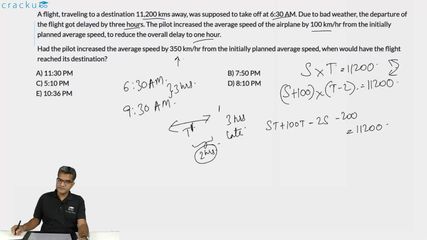A flight, traveling to a destination 11,200 kms away, was supposed to take off at 6:30 AM. Due to bad weather, the departure of the flight got delayed by three hours. The pilot increased the average speed of the airplane by 100 km/hr from the initially planned average speed, to reduce the overall delay to one hour.
Had the pilot increased the average speed by 350 km/hr from the initially planned average speed, when would have the flight reached its destination?
Solution
Let's assume the initial speed of the flight is F. And the time taken is t.
Given the distance to be travelled, 11200.
We know distance = speed *time.
So, 11200=Ft-->1
Due to bad weather, the flight started with a three-hour delay. Given that the flight speed increased by 100kmph, the delay would be reduced to one hour. So, it is nothing but the travel time is reduced by 2 hours.
In that case, the equation will become 11200=(F+100)*(t-2)-->2
Equation 1 can be re-written as t=$$\frac{11200}{F}$$-->3
Now Equation 2: $$\frac{11200}{F+100}$$=t-2
$$\Rightarrow$$ = $$\frac{11200}{F+100}$$+2=t
$$\frac{11200+2\left(F+100\right)}{F+100}=t$$
$$t=\frac{11400+2F}{F+100}$$-->4
Divide equation 3 by equation 4:'
$$\frac{t}{t}=\frac{\frac{11200}{F}}{\frac{11400+2F}{F+100}}$$
$$\Rightarrow$$ $$\frac{\left(11400+2F\right)}{F+100}=\frac{11200}{F}$$
$$\left(11400+2F\right)\cdot F=\left(F+100\right)\cdot11200$$
$$\left(11400F+2F^2\right)=\left(11200F+1120000\right)$$
$$\ 2F^2+200F-1120000=0\ \Rightarrow\ F^2+100F-560000=0$$
So, F=700 or -800. Speed can't be negative. So, the speed is 700km/hr.
Now, if the speed is increased by 350, the new speed will be 1050.
Hence, the time taken will be $$\frac{11200}{1050}=\frac{32}{3}=10\ \frac{2}{3\ }hrs=10hrs\ 40\min$$
The flight has to start at 6:30 am, but it is delayed by 3 hrs. So, the actual time is 9:30 am.
10hrs: 40mins from that will be 8:10 pm
Video Solution

Click on the Email ☝️ to Watch the Video Solution
Create a FREE account and get:
- All Quant Formulas and shortcuts PDF
- 15 XAT previous papers with solutions PDF
- XAT Trial Classes for FREE
